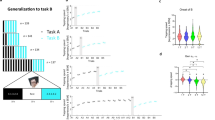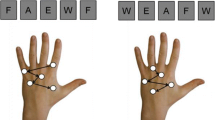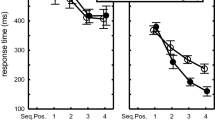Abstract
Research has shown that retrieval of learned information is better when the original learning context is reinstated during testing than when this context is changed. Recently, such contextual dependencies have also been found for perceptual-motor behavior. The current study investigated the nature of context-dependent learning in the discrete sequence production task, and in addition examined whether the amount of practice affects the extent to which sequences are sensitive to contextual alterations. It was found that changing contextual cues—but not the removal of such cues—had a detrimental effect on performance. Moreover, this effect was observed only after limited practice, but not after extensive practice. Our findings support the notion of a novel type of context-dependent learning during initial motor skill acquisition and demonstrate that this context-dependence reduces with practice. It is proposed that a gradual development with practice from stimulus-driven to representation-driven sequence execution underlies this practice effect.



Similar content being viewed by others
Notes
One may doubt, however, whether this effect truly involved the effect of incidental context, as the “incidental” features possibly became intentional over time. That is, participants may have used (one of) these features for sequence identification and/or execution as they probably required less effort to be processed compared to the intentional feature. In line with this possibility, Ruitenberg, Verwey and Abrahamse (unpublished work) found no indications of context-dependent sequence learning when the incidental context was static during training (i.e., all sequences were trained within the same context), and could therefore not be used for sequence identification.
Removing the left-handed and ambidextrous participants from the analyses did not yield a different pattern of results.
References
Abrahamse, E. L., & Verwey, W. B. (2008). Context dependent learning in the serial RT task. Psychological Research, 72, 397–404.
Anderson, T., Wright, D. L., & Immink, M. A. (1998). Contextual dependencies during perceptual-motor skill performance: Influence of task difficulty. Memory, 6, 207–221.
Annett, M. (1970). A classification of hand preference by association analysis. British Journal of Psychology, 61, 303–321.
Brown, S. D., & Heathcote, A. J. (2008). The simplest complete model of choice reaction time: Linear ballistic accumulation. Cognitive Psychology, 57, 153–178.
Cleeremans, A., & Jiménez, L. (2002). Implicit learning and consciousness: A graded, dynamic perspective. In R. M. French & A. Cleeremans (Eds.), Implicit learning and consciousness: An empirical, computational and philosophical consensus in the making? (pp. 1–40). Hove: Psychology Press.
Cock, J. J., Berry, D. C., & Buchner, A. (2002). Negative priming and sequence learning. European Journal of Cognitive Psychology, 14, 24–48.
Deroost, N., Zeischka, P., & Soetens, E. (2008). Negative priming in the SRT task: Learning of irrelevant sequences is enhanced by concurrent learning of relevant sequences. European Journal of Cognitive Psychology, 20, 47–68.
Destrebecqz, A., & Cleeremans, A. (2001). Can sequence learning be implicit? New evidence with the Process Dissociation Procedure. Psychonomic Bulletin and Review, 8, 343–350.
Eich, J. E. (1980). The cue-dependent nature of state-dependent retrieval. Memory and Cognition, 8, 157–173.
Fitts, P. M., & Posner, M. I. (1967). Learning and skilled performance in human performance. Belmont, CA: Brock-Cole.
Godden, D. R., & Baddeley, A. D. (1975). Context-dependent memory in two natural environments: On land and underwater. British Journal of Psychology, 66, 325–331.
Healy, A. F., Wohldmann, E. L., Parker, J. T., & Bourne, L. E., Jr. (2005). Skill training, retention, and transfer: The effects of a concurrent secondary task. Memory and Cognition, 33, 1457–1470.
Hikosaka, O., Nakahara, H., Rand, M. K., Sakai, K., Lu, X. F., Nakamura, K., et al. (1999). Parallel neural networks for learning sequential procedures. Trends in Neurosciences, 22, 464–471.
Hommel, B., Müsseler, J., Aschersleben, G., & Prinz, W. (2001). The theory of event coding (TEC): A framework for perception and action planning. Behavioral and Brain Sciences, 24, 849–937.
Nissen, M. J., & Bullemer, P. (1987). Attentional requirements of learning: Evidence from performance measures. Cognitive Psychology, 19, 1–32.
Schvaneveldt, R. W., & Gomez, R. L. (1998). Attention and probabilistic sequence learning. Psychological Research, 61, 175–190.
Smith, S. M. (1985). Background music and context-dependent memory. The American Journal of Psychology, 98, 591–603.
Smith, S. M., & Vela, E. (2001). Environmental context-dependent memory: A review and meta-analysis. Psychonomic Bulletin and Review, 8, 203–220.
Tubau, E., Hommel, B., & López-Moliner, J. (2007). Modes of executive control in sequence learning: From stimulus-based to plan-based control. Journal of Experimental Psychology General, 136, 43–63.
Verwey, W. B. (1999). Evidence for a multi-stage model of practice in a sequential movement task. Journal of Experimental Psychology Human Perception and Performance, 25, 1693–1708.
Verwey, W. B. (2010). Diminished motor skill development in elderly: Indications for limited motor chunk use. Acta Psychologica, 134, 206–214.
Verwey, W. B., Abrahamse, E. L., & De Kleine, E. (2010). Cognitive processing in new and practiced discrete keying sequences. Frontiers in Psychology, 1, 32. doi:10.3389/fpsyg.2010.00032.
Wright, D. L., & Shea, C. H. (1991). Contextual dependencies in motor skills. Memory and Cognition, 19, 361–370.
Acknowledgments
We would like to thank Annika Rausch for her assistance in running the experiment. The first author was supported by the Netherlands Organization for Scientific Research (NWO; contract number 400-07-097).
Open Access
This article is distributed under the terms of the Creative Commons Attribution Noncommercial License which permits any noncommercial use, distribution, and reproduction in any medium, provided the original author(s) and source are credited.
Author information
Authors and Affiliations
Corresponding author
Rights and permissions
About this article
Cite this article
Ruitenberg, M.F.L., De Kleine, E., Van der Lubbe, R.H.J. et al. Context-dependent motor skill and the role of practice. Psychological Research 76, 812–820 (2012). https://doi.org/10.1007/s00426-011-0388-6
Received:
Accepted:
Published:
Issue Date:
DOI: https://doi.org/10.1007/s00426-011-0388-6




